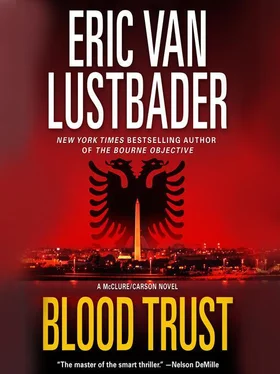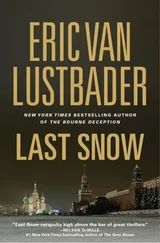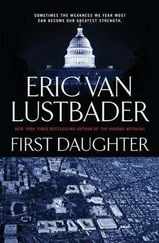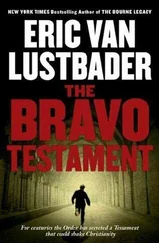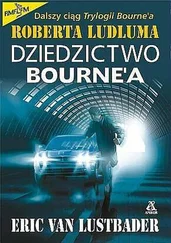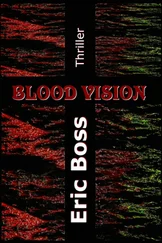People were terrified of the Syrian, and with good reason. You never knew what he was thinking or how he would react. He had a real name, of course, the one his parents had given him, but it had been so long since he had used it that it had been all but forgotten. Xhafa, for instance, had never known it.
“So,” the Syrian said now, “how was Washington?”
“I despise that city,” Xhafa said, “and it despises me. Dardan has been killed.”
“Is that such a tragedy?” The Syrian was not one to mince words or care who he defamed. “I warned you about him. He was weak.”
“He was family,” Xhafa said stiffly.
The Syrian grunted. “Sentiment is itself a weakness.”
Xhafa fought to swallow the rebuke. He feared the Syrian as much as everyone else, he simply refused to show it. It would do no good, he knew, to remind his companion that he had lost all his family to war. The Syrian never invoked their names; it was as if they had never existed. While in Washington, Xhafa had read of a recent DNA study that proved, genetically, at least, there wasn’t much difference between the Arabs and the Jews. Something else he dare not mention to his dour companion. On the other hand, losses were much on his mind.
“It’s not only Dardan,” he said now, “but my men in Tetovo. The entire fortress was destroyed.”
“That was, of course, always a possibility,” the Syrian’s face darkened, “but I cannot understand how the enemy escaped the ambush you laid for them in Dolna Zhelino.” His tone made it sound like the error was somehow Xhafa’s.
“They killed all my men.”
“Yes, but how?”
“My men—”
“Were no doubt happy to die for the cause,” the Syrian said with a dismissive sweep of his hand.
“My men are not yours,” Xhafa said. “They’re not ignorant mountain fanatics who die without a thought.”
The Syrian was not offended. In fact, he laughed. “This is true, Xhafa. The men of the mountains of Afghanistan and Western Pakistan are the defeated, the disenfranchised who were chased into their mountain lairs by stronger tribal forces. The mountains’ lawless state attracts the fanatics, the extremists, the outcasts of society. But, listen to me, Xhafa, they are my most valuable resource. Their ignorance breeds fanaticism and that is my stock in trade. They are my creatures because I tell them what they want to hear. In return, they do what I tell them to do.”
He puffed out his cheeks, his eyes alight. His ideas made him restless. “What they want is simple: They want to blow up the society that cast them out. This is the opportunity I give them and they are grateful.”
“They have proved to be the best weapon we have against the West,” Xhafa said.
The Syrian snorted. “The West believes that it is their fanaticism that makes them cruel, but, no, this is incorrect. What makes them cruel is their monumental ignorance. They have no conception of the world. Good for me. Even better, they don’t care, so I don’t even need to lie to them. They’ll never get what they want, of course, but in the meantime they are useful as agents of chaos. And because they wish to martyr themselves for their doomed cause, they keep coming. They die and they rise endlessly.”
The Syrian stroked his beard. “But never mistake me for one of them, Xhafa. As you know, I come from the lowlands, from a wealthy family. I’m well educated, a graduate of universities in both the East and the West—under different names, of course. You might say that I’m a man of the world. A prerequisite to understanding the enemy.”
A certain tension informed his body. “What must be understood is the cause of the enemy’s success.” Being a master tactician, he was understandably focused on battlefield failures. In contrast, the loss of human life was of importance to him only inasmuch as it affected his plans. “The failure in Dolna Zhelino might be explained away by happenstance, but not the complete destruction of your fortress in Tetovo.” He tapped his forefinger on his knee. “No, there is another factor here of which we’re ignorant.”
Xhafa shook his head. “I still don’t understand the need for such complexity.”
“That’s because you haven’t studied this Jack McClure. His mind works best within complicated situations. To him, that’s the way the world works, and he’s not far off the mark. Give him something simple to solve and he’ll become immediately suspicious. Frankly, he’s a con artist’s worst nightmare. To my knowledge only one person was able to con him, and then not for long.”
“Annika Dementieva.”
“Correct.” The Syrian sighed. “You know, Xhafa, I tried to do this the simple way, but, try as I might, I couldn’t get to Gourdjiev. I lost half a dozen of my best men in the process. Even at his age, that wily old fucker is still formidable.”
The Syrian stretched in his seat and cracked his knuckles. “So I had to tackle the problem from another angle entirely. I decided to go after Annika. But I knew I couldn’t do it directly. I had to move softly and take a roundabout route.”
“Which is where McClure comes in.”
“There is something between Annika and McClure, of that there can be no doubt.” The Syrian smiled his crooked smile. “As I said, sentiment is itself a weakness.”
“Maybe she’s continuing to play him.”
The Syrian scratched at the thicket of his beard, which was shot through with white. “That possibility has occurred to me.” His smile widened. “But the beauty of my plan is that it doesn’t matter. She is so heavily defended and almost as wily as her grandfather that McClure is the best way—probably the only way—to get to her. And she, my dear Xhafa, is the only way to get to Gourdjiev and all the secrets locked up in that brilliant mind of his.”
He sighed again. “The truth is, I cannot go forward without those secrets.”
Xhafa pricked up his ears. This was the first time the Syrian had come close to defining the goal of his plan—a plan he had been forced to go along with if he wanted to continue the very profitable arrangement he had with the Syrian. A powerful incentive, since this arrangement had provided him with capital and influence in exchange for a third of his smuggling operation. Now Xhafa’s small fleet of new and larger planes were filled with the Syrian’s mysterious cargo as well as Xhafa’s stolen girls.
“Just what are those secrets?”
“Enough criminal dirt and serious indiscretions to take control of his worldwide constellation of politicians and security officers.”
Xhafa would have staked his life on the fact that the Syrian was not telling the truth or, at least, not the whole truth, but he let it go because, humiliatingly, there was nothing he could do. The hard truth was that he felt like a child beside this man, this monument to power.
The rain beat down hard against the reinforced metal top and the landscape outside was gray and hazy, like a painting whose colors had run together. They had been joined by a phalanx of motorcycle police fore and aft, the caravan cutting a swath through the streets with the seething din of war.
The Syrian shifted again, the aura of his power rippling outward, filling the entire vehicle so completely that Xhafa could scarcely draw breath.
“And as to the other part of your mission…?” The Syrian let his last words hang between them like an implied threat.
“Arjeta Kraja is dead,” Xhafa said. “I killed her with my own hands.”
* * *
“THE LAST time I saw Naomi Wilde?”
“That’s what I asked.”
Peter McKinsey shifted in his chair. It was a stiff chair with one of those minimalist backs guaranteed to make you more uncomfortable the longer you sat in it. He was downtown at Metro Police HQ, in a separate suite of offices reserved for the Violent Crimes Unit.
Читать дальше
